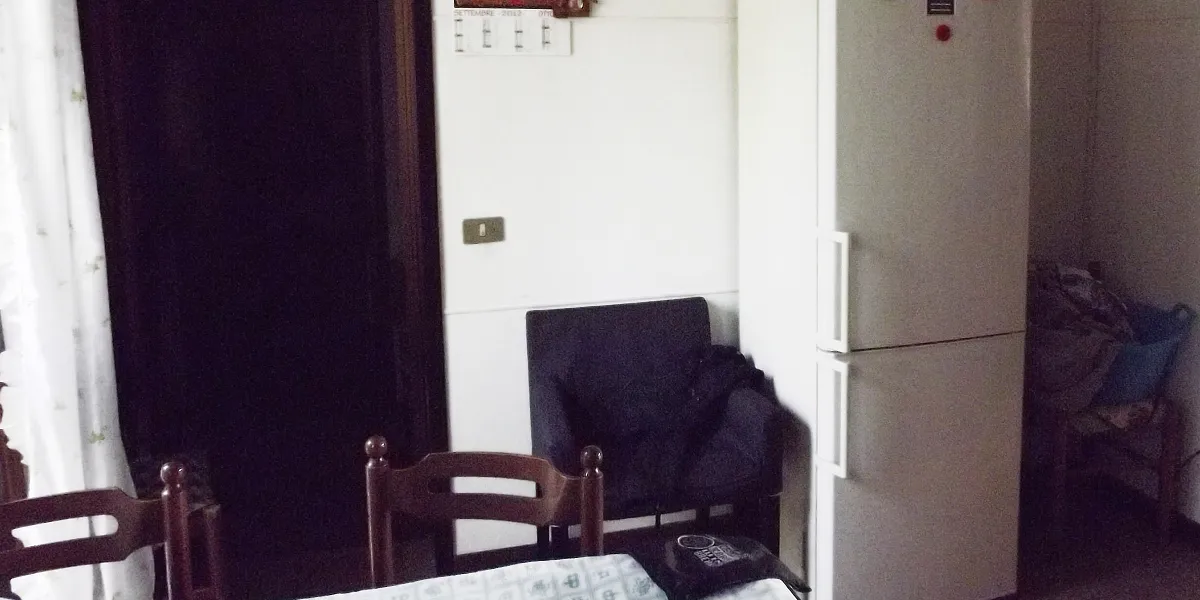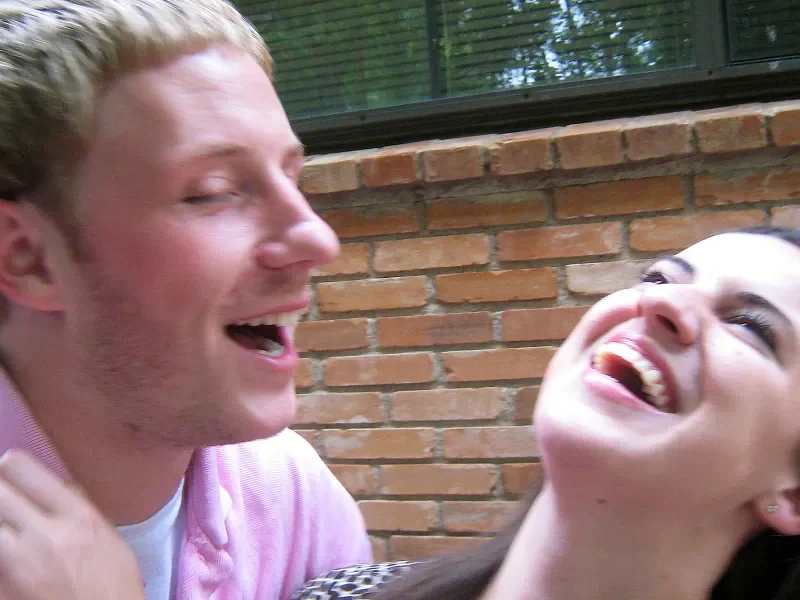When my old fridge died, I scraped together everything I had and bought a used one from a thrift store. A strange woman begged to buy it instead, but I got there first. Three days later, I found something hidden inside that made my heart race.
I’m 63 years old, and for the past four years, it’s been just me and my grandsons, Noah and Jack. They’re eight-year-old twins with sticky fingers, endless questions, and hearts big enough to melt the coldest day.
Their parents, my daughter Sarah and her husband Mike, died in a car accident when the boys were only four. Since then, I’ve been both Grandma and Mom, doing my best to keep us afloat on a fixed income and more determination than sense.
People always say grandkids keep you young. I tell them grandkids keep you exhausted and running on coffee fumes.
Every dollar I earn gets stretched like taffy. We buy off-brand cereal, wear secondhand clothes, and make do with whatever we have. The fridge in my kitchen came with the house back in 1992, a big beige beast that rattled like a diesel truck every time the compressor kicked on. But it worked, and that was all that mattered.
Until last month, when things took an unexpected turn.
It happened on a Sunday morning. I opened the fridge door to pour milk for the boys’ cereal, and a wave of warm, sour air hit me square in the face. The light inside was dead, and the milk felt room temperature in my hand.
Oh, no, I thought.
I unplugged the whole thing, waited ten minutes, and plugged it back in. Nothing. I whispered a prayer, jiggled the temperature dial, and even gave it a good kick for measure. Still nothing.
By noon, half our groceries were spoiled and sitting in trash bags on the back porch.
I sat at the kitchen table with my head in my hands while Noah and Jack played with toy cars on the floor.
“Grandma,” Jack said softly, sliding his little hand onto my arm. “Is the fridge dead?”
I laughed, even though tears were burning behind my eyes. “Looks like it, baby.”
“Can we fix it?” Noah asked, his serious brown eyes searching my face.
“I don’t think so, sweetheart.”
We’d been saving a little money, about $180, for back-to-school clothes. Now it was fridge money, and my heart ached at the thought of the boys starting third grade in shoes that were already too tight.
The next day, I packed Noah and Jack into the car and drove to Second Chance Thrift, a dusty little appliance shop on the edge of town that smelled like motor oil and old coffee. Inside, rows of used fridges stood like soldiers, tall and dented.
The owner, a round man with kind eyes and grease-stained hands, greeted us at the door. His name was Frank, and I’d bought a washing machine from him two years ago.
“What’re you looking for today, sweetheart?” he asked, wiping his hands on a rag.
“Something that stays cold,” I said, managing a tired smile. “And costs less than my mortgage. I hope that’s not too difficult.”
He laughed. “Alright, alright. Let me show you what I’ve got.”
He led us to a corner where an older white Whirlpool stood against the wall. It was dented on one side, missing a shelf inside, but the motor was running, and it felt cold when I stuck my hand in.
“Hundred and twenty bucks,” Frank said. “She’s old, but she’s faithful. Had her tested this morning.”
I was about to nod and shake his hand when I heard a sharp voice behind me.
“I’ll take it.”
I immediately turned around.
A woman stood there, maybe 70 years old, tall and thin with a long gray braid draped over one shoulder. She wore a floral scarf around her neck, and her sharp blue eyes flicked between me and the fridge with an intensity that made me uncomfortable.
Frank held up a hand. “No, not this time, Mabel. It’s hers.”
The woman, Mabel, frowned deeply. “Please, Frank. I’ve been looking for a fridge exactly like this one for months. It’s special to me.”
“Special?” I repeated. “What’s so special about it? It’s just an old fridge.”
She stared at me for a long moment, her lips pressed into a thin line. Then she sighed, her shoulders sagging.
“Never mind,” she said quietly. “Let her have it.”
I didn’t know whether to feel guilty or grateful. The boys tugged at my sleeves, and I could feel their impatience radiating off them like heat.
Frank looked between us, clearly uncomfortable. “Tell you what, Evelyn. Let me deliver it to your place this afternoon. Free of charge.”
“That’s very kind of you, Frank. Thank you.”
As we turned to leave, I caught Mabel’s eyes one more time. She was watching me with an expression I couldn’t quite read. It wasn’t anger or resentment. It was something closer to sorrow.
It sent a chill down my spine, but I shook it off and ushered the boys out to the car.
By evening, the fridge was sitting in my kitchen, humming its steady tune. I stocked it with what little we had left, and for that night at least, everything seemed fine. The boys were thrilled to have cold juice boxes again.
But the next morning, something changed. I heard a strange noise coming from the kitchen, a sputtering sound like the fridge was hiccupping. When I opened the freezer door, it stuck, and I had to yank it hard to get it open.
“Great,” I muttered to myself. “A haunted fridge.”
By day three, the motor was making a clunking sound that rattled the whole kitchen, and the light inside flickered every time I opened the door.
I was convinced that woman at the shop, Mabel, must have known something was wrong with it. Maybe that’s why she’d wanted it so badly, I thought.
By Thursday, I was furious. My money was gone, food was starting to spoil again, and the twins were whining about wanting popsicles that kept melting.
“Fine,” I said, grabbing a screwdriver from the junk drawer. “Let’s see what’s wrong with you.”
I pulled out the freezer drawer and started prying open the back panel. Something small and metallic rattled loose and fell onto the floor with a dull clink.
I bent down and picked it up.
It was a tin box, old and rusted around the edges, sealed with yellowed tape. And written on top, in faded blue ink, were words that made my heart skip a beat, “If you found this, you were meant to.”
My heart started pounding hard against my ribs. With shaking hands, I peeled away the tape and opened the lid. Inside was a folded envelope and a small velvet pouch, both worn with age.
The envelope had writing on it, “To Mabel or whoever fate chooses instead.”
I looked at the name with wide eyes. Mabel. The woman from the store.
I carefully unfolded the letter inside. The handwriting was shaky but elegant, written in faded ink that had turned brown with time.
“If you’re reading this, it means I didn’t make it in time to get the fridge back. My husband built a secret compartment in it during the war. He said every home needs a place to keep hope safe. Inside the pouch is what’s left of his hope. If you need it, use it. If you don’t, pass it to someone who does. — Margaret, 1954.”
My hands were trembling so badly I almost dropped the letter. I picked up the velvet pouch and loosened the drawstring.
Inside was a gold wedding band, tarnished but still beautiful, and a small envelope labeled “Insurance papers” in the same handwriting.
But when I opened that envelope, something else slipped out and fluttered onto the kitchen table.
It was a cashier’s check.
I blinked, not understanding what I was seeing at first. Then the numbers came into focus, and my breath caught in my throat.
The check was made out for $25,000, dated just last month. And it was signed by Mabel.
I sat there at the kitchen table, staring at it, completely stunned. The kitchen clock ticked loudly in the silence. Somewhere in the living room, the boys were laughing at cartoons, but their voices sounded a million miles away.
The check was valid. I called the bank listed on it with shaking fingers, and after being transferred twice, a woman confirmed it was real. It was a trust withdrawal under something called the Margaret Estate.
The realization hit me hard.
Mabel, the woman at the store, was probably Margaret’s daughter. That fridge had belonged to her family. And she had known exactly what was hidden inside.
But she’d let me buy it anyway.
That night, I barely slept. Every time I closed my eyes, I saw Mabel’s face, that look of sorrow in her eyes when she’d walked away from the fridge.
I couldn’t keep the money, not like this. It didn’t feel right. It felt like I’d stolen something precious from a dying woman.
So, the next morning, I loaded the boys into the car and drove straight back to Second Chance Thrift.
Frank was in the back, testing a dryer, and he looked up in surprise when he saw me.
“Fridge giving you trouble again already?” he asked, wiping his hands.
“Not exactly,” I said. “Where can I find Mabel? I need to talk to her.”
Frank’s expression changed instantly. His smile faded, and he set down the rag he was holding. “Oh, honey. Mabel passed away last week.”
I couldn’t believe it.
“She what?” I blurted out.
“She passed away,” Frank repeated.
I took a step backward, trying to process what I just heard.
“She was here just a few days before she went into hospice,” Frank continued softly, his eyes kind and sad. “She seemed very particular about that fridge. Said she wanted to make sure it ended up somewhere it could do some good.”
I stood there in that dusty shop, tears burning hot behind my eyes, unable to speak.
A few days later, a letter arrived in my mailbox.
There was no return address, just my name written in neat, careful script across the front. My hands shook as I opened it.
Inside was a note written on simple white paper.
“Dear Evelyn, I hope you found the gift. I told Mom she’d find someone who needed it more than I did. She believed in signs, said if it was meant for someone, they’d cross paths naturally. She was right. I’m Mabel’s son, Tom. She told me about you and the twins before she passed. Mom said you reminded her of herself, raising kids alone, doing whatever it takes. Keep the money. She wanted it that way. But if you ever can, pay it forward. — Tom.”
I cried until I couldn’t anymore, sitting at that same kitchen table where I’d found the check. Then I carefully folded the note and tucked it behind one of the fridge magnets, right next to a crayon drawing the boys had made of a dinosaur eating ice cream.
The check paid for a reliable used car, Noah’s asthma medication for the whole year, and a savings account for the boys’ college fund. But we kept the old fridge. I couldn’t bring myself to let it go, not after everything.
It still hums at night, steady and quiet, a sound that somehow feels like peace.
Every so often, when someone from church mentions they’re struggling, lost a job, fallen behind on bills, I bake them a casserole and hand it over with a quiet prayer.
“This fridge has magic in it,” I tell the boys sometimes. “Real magic.”
Because maybe that’s what kindness really is. Something hidden, waiting quietly until someone desperate enough opens the door and finds hope still tucked inside.


